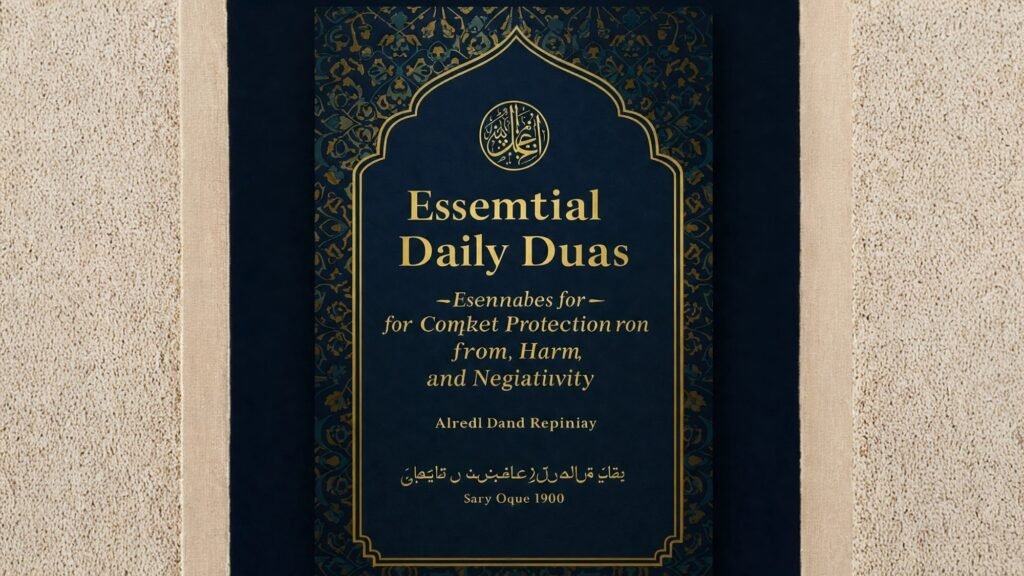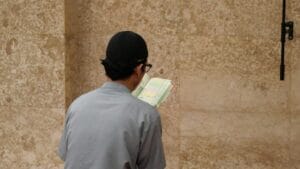Daily Duas: In Islam, dua (supplication) is more than just words—it’s a heartfelt connection between a believer and Allah (SWT), the Most Merciful, the Most Powerful. Muslims turn to dua as a shield against life’s challenges, seeking protection from evil, harm, and negativity that can come from various sources—whether spiritual, like the influence of jinn or the evil eye, or physical, such as accidents or illness. The Prophet Muhammad (PBUH) taught us specific supplications to recite daily, ensuring that we remain under Allah’s divine care.
This in-depth guide is designed to help you discover the most essential daily Islamic duas for protection. These supplications, rooted in the Quran and authentic Hadith, are practical, powerful, and easy to incorporate into your routine. Whether you’re looking to safeguard yourself, your family, or your home, this article provides everything you need—authentic duas, their meanings, when to recite them, and additional tips to enhance your spiritual well-being.
We’ll also explore how to make these duas a seamless part of your day, share resources for learning more, and provide insights into complementary practices that strengthen your protection. From morning and evening recitations to supplications for specific moments, this guide is your go-to resource for living a life blessed with peace and security.

Why Duas Matter: A Spiritual Shield in Daily Life
Dua is a cornerstone of Islamic faith, a direct line to Allah (SWT) that reflects trust and dependence on Him. The Quran beautifully captures this promise:
“And when My servants ask you concerning Me, indeed I am near. I respond to the invocation of the supplicant when he calls upon Me.” (Surah Al-Baqarah, 2:186)
The Prophet Muhammad (PBUH) emphasized dua as a weapon against evil and a source of strength in times of distress. For Muslims, daily supplications are not just rituals—they’re a way to seek Allah’s protection from harm, negativity, and the unseen forces that can disrupt our peace. Whether it’s the whispers of Shaytan, the envy of others, or the unpredictability of life, these duas provide a spiritual fortress.
In this guide, we’ll walk you through a collection of essential daily duas, explain their significance, and show you how to weave them into your life. By the end, you’ll have a clear understanding of how these supplications can transform your day-to-day experience, bringing you closer to Allah and shielding you from harm.
Read more:
Essential Daily Duas for Protection
Below, you’ll find a carefully curated list of authentic Islamic duas for protection from evil, harm, and negativity. Each dua includes its Arabic text, transliteration for easy pronunciation, English translation, and an explanation of its purpose and benefits.
1. Morning and Evening Dua for General Protection
The morning and evening adhkar (remembrances) are a vital part of a Muslim’s daily routine, offering protection throughout the day and night.
Dua:
أَعُوذُ بِكَلِمَاتِ اللَّهِ التَّامَّاتِ مِنْ شَرِّ مَا خَلَقَ
Transliteration:
A’udhu bi kalimatillahit-tammati min sharri ma khalaq.
Translation:
“I seek refuge in the perfect words of Allah from the evil of what He has created.”
When to Recite:
- Three times after Fajr (morning prayer) and three times after Maghrib (evening prayer).
Significance:
This short yet powerful dua is a blanket of protection against all forms of evil—whether from humans, jinn, animals, or other creations. The Prophet (PBUH) taught that reciting it regularly ensures safety from harm throughout the day and night.
Tip: Pair this dua with gratitude to Allah for His countless blessings—it enhances your spiritual focus.
2. Dua for Safety from All Harm
This supplication invokes Allah’s name as a shield against anything that could cause harm, seen or unseen.
Dua:
بِسْمِ اللَّهِ الَّذِي لَا يَضُرُّ مَعَ اسْمِهِ شَيْءٌ فِي الْأَرْضِ وَلَا فِي السَّمَاءِ وَهُوَ السَّمِيعُ الْعَلِيمُ
Transliteration:
Bismillahilladhi la yadurru ma’asmihi shay’un fil-ardi wa la fis-sama’i wa huwas-sami’ul-‘alim.
Translation:
“In the name of Allah, with whose name nothing on earth or in the heavens can cause harm, and He is the All-Hearing, the All-Knowing.”
When to Recite:
- Three times in the morning and three times in the evening.
Significance:
This dua is a testament to the power of Allah’s name. It’s said that whoever recites it three times daily will be protected from sudden calamities, poison, and all forms of harm. It’s a reminder that Allah’s knowledge and hearing encompass everything.
Tip: Recite this dua slowly, reflecting on Allah’s infinite power and mercy.
3. Dua Against the Evil Eye and Envy
The evil eye (ayn) is a real threat in Islam, caused by envy or harmful intentions. This dua seeks Allah’s refuge from such negativity.
Dua:
أَعُوذُ بِكَلِمَاتِ اللَّهِ التَّامَّةِ مِنْ كُلِّ شَيْطَانٍ وَهَامَّةٍ وَمِنْ كُلِّ عَيْنٍ لَامَّةٍ
Transliteration:
A’udhu bi kalimatillahit-tammati min kulli shaytanin wa hammatin wa min kulli ‘aynin lammatin.
Translation:
“I seek refuge in the perfect words of Allah from every devil and poisonous creature, and from every evil eye.”
When to Recite:
- Anytime you feel vulnerable to envy, or daily as a preventive measure.
Significance:
This dua is especially powerful for protecting against the evil eye, jealousy, and the influence of Shaytan. It’s often recited over children or loved ones to shield them from harm.
Tip: Combine this dua with Surah Al-Falaq and Surah An-Nas for added protection.
4. Dua When Leaving the House
Stepping out into the world exposes us to countless uncertainties. This dua ensures Allah’s protection as you leave your home.
Dua:
بِسْمِ اللَّهِ، تَوَكَّلْتُ عَلَى اللَّهِ، وَلَا حَوْلَ وَلَا قُوَّةَ إِلَّا بِاللَّهِ
Transliteration:
Bismillah, tawakkaltu ‘alallah, wa la hawla wa la quwwata illa billah.
Translation:
“In the name of Allah, I place my trust in Allah, and there is no power or strength except with Allah.”
When to Recite:
- Every time you leave your house.
Significance:
The Prophet (PBUH) said that whoever recites this dua when leaving home will be protected from evil, guided, and sufficed by Allah. It’s a declaration of trust in His divine plan.
Tip: Pause at the door, recite this dua, and step out with your right foot for blessings.
5. Dua When Entering the House
Returning home should be a moment of peace and protection. This dua blesses your entry.
Dua:
بِسْمِ اللَّهِ وَلَجْنَا، وَبِسْمِ اللَّهِ خَرَجْنَا، وَعَلَى اللَّهِ رَبِّنَا تَوَكَّلْنَا
Transliteration:
Bismillahi walajna, wa bismillahi kharajna, wa ‘ala Allahi rabbina tawakkalna.
Translation:
“In the name of Allah we enter, and in the name of Allah we leave, and upon Allah, our Lord, we place our trust.”
When to Recite:
- Every time you enter your home.
Significance:
This dua ensures your home remains a sanctuary under Allah’s protection. It also expresses gratitude for safe travels and reliance on Him.
Tip: Greet your family with “As-Salamu Alaikum” after reciting this dua to spread peace.
6. Dua Before Sleeping
Sleep leaves us vulnerable, making this dua essential for protection through the night.
Dua:
بِاسْمِكَ رَبِّي وَضَعْتُ جَنْبِي، وَبِكَ أَرْفَعُهُ، فَإِنْ أَمْسَكْتَ نَفْسِي فَارْحَمْهَا، وَإِنْ أَرْسَلْتَهَا فَاحْفَظْهَا بِمَا تَحْفَظُ بِهِ عِبَادَكَ الصَّالِحِينَ
Transliteration:
Bismika rabbi wada’tu janbi, wa bika arfa’uhu, fa in amsakta nafsi farhamha, wa in arsaltaha fahfazha bima tahfazu bihi ‘ibadakas-salihin.
Translation:
“In Your name, my Lord, I lay down my side, and in Your name, I raise it. If You take my soul, have mercy on it, and if You send it back, protect it with what You protect Your righteous servants.”
When to Recite:
- Before going to bed, after lying down.
Significance:
This dua entrusts your soul to Allah during sleep, seeking His mercy and protection. It’s a beautiful way to end your day with faith.
Tip: Recite Ayat-ul-Kursi (Surah Al-Baqarah, 2:255) before this dua for added safeguarding.
7. Dua for Protection from Fear and Anxiety
When negativity or fear creeps in, this dua offers immediate relief and protection.
Dua:
حَسْبِيَ اللَّهُ لَا إِلَهَ إِلَّا هُوَ، عَلَيْهِ تَوَكَّلْتُ، وَهُوَ رَبُّ الْعَرْشِ الْعَظِيمِ
Transliteration:
Hasbiyallahu la ilaha illa huwa, ‘alayhi tawakkaltu, wa huwa rabbul-‘arshil-‘azim.
Translation:
“Allah is sufficient for me; there is no deity except Him. Upon Him I rely, and He is the Lord of the Mighty Throne.”
When to Recite:
- Anytime you feel anxious, afraid, or overwhelmed.
Significance:
This dua, derived from the Quran (Surah At-Tawbah, 9:129), reinforces that Allah alone is enough to handle any situation, dispelling fear and negativity.
Tip: Repeat this dua seven times for a calming effect.
How to Incorporate Duas into Your Daily Routine
Making these supplications a habit doesn’t have to be overwhelming. Here’s how to seamlessly integrate them into your life.
Best Times to Recite Duas
- Morning (After Fajr): Start your day with protective duas to set a positive tone.
- Evening (After Maghrib): Recite evening adhkar to safeguard yourself through the night.
- Before Sleep: End your day with duas that protect you while resting.
- Entering/Exiting Home: Use these moments to invoke Allah’s blessings on your movements.
Practical Tips for Consistency
- Set Reminders: Use your phone or a prayer app to prompt you at key times.
- Memorize Gradually: Start with one or two duas and add more as you grow comfortable.
- Teach Your Family: Reciting together builds a collective shield of protection.
- Keep a Dua Book Handy: A pocket-sized book like Fortress of the Muslim can be a great reference.
Enhancing Your Dua Experience
- Perform Wudu: Purity amplifies the spiritual impact of your supplications.
- Face the Qibla: This shows reverence and focus.
- Raise Your Hands: A humble gesture that symbolizes your need for Allah.
- Recite with Heart: Mean every word you say—sincerity is the soul of dua.
Common Mistakes to Avoid When Reciting Duas
To ensure your supplications are effective, steer clear of these pitfalls:
- Rushing Through: Take time to reflect on the meanings, don’t just speed-read.
- Doubting Allah’s Response: Have full trust that Allah hears and answers in the best way.
- Inconsistency: Sporadic recitation weakens your spiritual routine—aim for daily practice.
- Ignoring Context: Recite duas at their recommended times for maximum benefit.
Additional Practices to Boost Protection
Duas are powerful, but combining them with other Islamic practices creates a stronger defense against evil, harm, and negativity.
1. Recite Protective Surahs
- Surah Al-Fatiha: The opening chapter of the Quran, a cure for all ailments.
- Surah Al-Ikhlas, Al-Falaq, and An-Nas: Known as the Mu’awwidhatayn, these surahs shield against evil forces.
- Ayat-ul-Kursi: Reciting this verse (Surah Al-Baqarah, 2:255) after every prayer keeps Shaytan away.
2. Give Charity (Sadaqah)
The Prophet (PBUH) said charity extinguishes calamity. Even small acts, like feeding a needy person, can ward off harm.
3. Maintain Strong Faith
A heart rooted in taqwa (God-consciousness) is less susceptible to negativity. Regular prayer, fasting, and good deeds fortify your spirit.
4. Avoid Sinful Behavior
Sin invites vulnerability. Strive to live righteously, seeking forgiveness when you falter.
Deepening Your Knowledge: Resources for Learning Duas
If you’re eager to expand your understanding of Islamic supplications, there are plenty of reliable resources available. Below, we’ve compiled options for online courses, books, and apps, complete with reviews and costs.
Online Courses
- SeekersGuidance
- Overview: Offers free and paid courses on Islamic studies, including lessons on duas and daily remembrances.
- Cost: Free basic courses; premium courses range from $50-$200.
- Review: “Excellent content delivered by knowledgeable scholars.” (Rating: 4.5/5)
- Islamic Online University
- Overview: Provides structured programs with modules on supplications and their significance.
- Cost: $100-$500 per course; degree programs up to $5,000/year.
- Review: “A game-changer for Islamic education.” (Rating: 4.7/5)
- Mishkah University
- Overview: Focuses on practical and spiritual aspects of Islam, including dua.
- Cost: $150-$300 per semester.
- Review: “Perfect for busy learners.” (Rating: 4.6/5)
Recommended Books
- “Fortress of the Muslim” by Sa’id bin Ali bin Wahf Al-Qahtani
- Overview: A compact collection of authentic duas for every occasion.
- Cost: $10-$15 (paperback); $5 (e-book).
- Review: “A must-have for every Muslim household.” (Rating: 4.8/5)
- “The Book of Remembrance” by Imam Nawawi
- Overview: A detailed guide to supplications with commentary.
- Cost: $20-$30 (paperback).
- Review: “Deeply insightful and beautifully written.” (Rating: 4.9/5)
Mobile Apps
- Muslim Pro
- Overview: Includes duas, prayer times, and Quran recitation.
- Cost: Free with ads; $5-$10 for premium.
- Review: “User-friendly and comprehensive.” (Rating: 4.7/5)
- Dua & Azkar
- Overview: Focused on supplications with audio and translations.
- Cost: Free; $2 for ad-free version.
- Review: “Simple yet effective.” (Rating: 4.6/5)
Free Resources
- Websites: IslamQA.info offers answers and duas from scholars.
- YouTube Channels: MercifulServant and The Daily Reminder provide free video lessons on supplications.
Fees Structure: Investing in Your Spiritual Growth
Learning about duas doesn’t have to break the bank. Here’s a breakdown of typical costs:
- Free Options: Many apps, websites, and YouTube channels offer no-cost content.
- Books: $5-$30 depending on format and shipping.
- Short Courses: $50-$200 for specialized programs.
- Long-Term Programs: $1,000-$5,000 annually for degree-level studies.
- Apps: Free basic versions; $2-$10 for premium features.
For budget-conscious learners, start with free resources and gradually invest in books or courses as you grow.
Real-Life Benefits of Daily Duas
The impact of reciting these supplications goes beyond spiritual protection—it transforms your daily life. Here’s how:
- Peace of Mind: Knowing Allah is watching over you reduces stress and anxiety.
- Stronger Faith: Regular dua deepens your trust in Allah’s plan.
- Family Harmony: Teaching these duas to your loved ones fosters unity and blessings at home.
- Resilience: You’re better equipped to face life’s challenges with a protected heart.
Take the story of Aisha, a mother of three: “I started reciting morning and evening duas after noticing my kids were often unsettled. Within weeks, our home felt calmer, and I felt more at ease knowing Allah’s protection was with us.”
Conclusion: Start Your Journey with Duas Today
The beauty of these essential daily duas lies in their simplicity and power. They’re not just words—they’re a lifeline to Allah’s mercy, a shield against evil, harm, and negativity, and a source of endless blessings. By making them part of your routine, you invite peace, protection, and purpose into your life.
Begin small—choose one or two duas to recite daily, then build from there. Explore the resources shared here to deepen your practice, and share this knowledge with others. Whether you’re a beginner or a seasoned worshipper, these supplications are a gift from Allah and His Messenger (PBUH) to keep you safe and strong.
May Allah (SWT) accept your efforts, protect you from all harm, and fill your life with His light. Ameen.














Post Comment